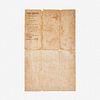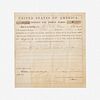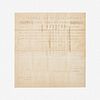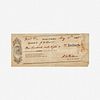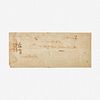[African-Americana] Freedmen's Bureau Labor Contract and Other Documents Relating to the Plantation of John Heard Burns
About Seller
2400 Market St
Philadelphia, PA 19147
United States
Established in 1805, Freeman’s Auction House holds tradition close, with a progressive mind-set towards marketing and promotion, along with access to a team of top experts in the auction business. And now with offices in New England, the Southeast, and on the West Coast, it has never been easier to ...Read more
Two ways to bid:
- Leave a max absentee bid and the platform will bid on your behalf up to your maximum bid during the live auction.
- Bid live during the auction and your bids will be submitted real-time to the auctioneer.
Bid Increments
| Price | Bid Increment |
|---|---|
| $0 | $25 |
| $500 | $50 |
| $1,000 | $100 |
| $2,000 | $200 |
| $3,000 | $250 |
| $5,000 | $500 |
| $10,000 | $1,000 |
| $20,000 | $2,000 |
| $30,000 | $2,500 |
| $50,000 | $5,000 |
| $100,000 | $10,000 |
About Auction
May 20, 2021
A collection of books and manuscripts. Curated by Darren WInston, Head of the Books and Manuscripts Department at Freeman's. Freeman's info@freemansauction.com
- Lot Description
Caddo Parish, Louisiana, 1865. Mini-archive of four items relating to the plantation of John Heard Burns, including one partially-printed Freedmen's Bureau labor contract, listing 22 formerly enslaved African Americans, with their names and signatures ("x"). Also listed are their ages (15-58), laborer class designation (1-3), as well as their wages which appear as payment-in-kind using pork, corn, flour, etc., in lieu of cash (notably, "monthly" in the wages box, is crossed out). In one case there is a deduction for travel: "wages deducted for time lost to go to Mobile". Signed by plantation owner J.H. Burns, and countersigned by Freedmen's Bureau Assistant Superintendent, H.F. Peevy, dated August 9, 1865. One partially-printed federal tax receipt, certifying that Burns paid $6.48 for "the collection of direct taxes in insurrectionary districts" on 1,000 acres of land valued at $4,092, signed for the commisioners of Direct Taxes for Louisiana, dated September 7, 1865. One partially-printed Caddo Parish tax receipt for $108.45, signed by Sheriff and Collector, J.W. Pickens, dated May 15, 1865. One carte de visite portrait of Burns. Condition varies; labor contract separated along center vertical fold, as well as bottom left fold, other small separations and chips along folds.
A very rare survival. Freedmen's Bureau labor contract, between 22 newly emancipated African Americans and their former slave holder, dated just four months after the end of the Civil War. Located near Bethany (Lickskillet) in Caddo Parish, in northwestern Louisiana, the Burns plantation covered 1,000 acres and grew cotton, corn, wheat, potatoes, etc.
The Freedmen's Bureau, established a month before the end of the Civil War, was critical in helping formerly enslaved African Americans, like the above, negotiate their new freedom--devising labor contracts and settling labor disputes, providing food, shelter, building schools and hospitals, and providing legal aid--all while operating against intense hostility from local white populations. Although this contract granted these 22 formerly enslaved men and women the means by which to, on paper, control the means of their labor and exercise choice in their employment, they were still subject to, and most likely experienced, exploitation and acts of violence, intimidation, and murder. As Reconstruction progressed and Freedmen excerised their rights, especially voting, white resistance and terrorism grew more rampant. As Solomon K. Smith observes, Caddo Parish accounted for 16 percent of all Reconstruction-era homicides against Freedmen in Louisiana, while accounting for less than 3 percent of the states population (Smith, The Freedmen's Bureau in Shreveport, Louisiana History: The Journal of the Louisiana Historical Association, Vol. 41, No. 4, Autumn, 2000, pp. 435-465). The perpetually underfunded and understaffed Bureau (at its height, it only employed 900 agents across all 11 former Confederate states) was limited in its ability to provide protection from violence as well as provide oversight in labor disputes. Caddo Parish--relatively isolated, never effectively controlled by Union Forces, and spared some of the more destructive aspects of the war compared to other areas in the South--viewed the Bureau's efforts with more suspicion and likewise targeted it with more overt acts of violence and intimidation. Ultimately, due to rising resistance from white Southerners, and the continuing effort to hinder the progress of the Bureau's activities across the South, it was dismantled only seven years later, in 1872.
We can locate only one other Freedmen's Bureau labor contract ever offered at auction.
- Shipping Info
-
No lot may be removed from Freeman’s premises until the buyer has paid in full the purchase price therefor including Buyer’s Premium or has satisfied such terms that Freeman’s, in its sole discretion, shall require. Subject to the foregoing, all Property shall be paid for and removed by the buyer at his/ her expense within ten (10) days of sale and, if not so removed, may be sold by Freeman’s, or sent by Freeman’s to a third-party storage facility, at the sole risk and charge of the buyer(s), and Freeman’s may prohibit the buyer from participating, directly or indirectly, as a bidder or buyer in any future sale or sales. In addition to other remedies available to Freeman’s by law, Freeman’s reserves the right to impose a late charge of 1.5% per month of the total purchase price on any balance remaining ten (10) days after the day of sale. If Property is not removed by the buyer within ten (10) days, a handling charge of 2% of the total purchase price per month from the tenth day after the sale until removal by the buyer shall be payable to Freeman’s by the buyer. Freeman’s will not be responsible for any loss, damage, theft, or otherwise responsible for any goods left in Freeman’s possession after ten (10) days. If the foregoing conditions or any applicable provisions of law are not complied with, in addition to other remedies available to Freeman’s and the Consignor (including without limitation the right to hold the buyer(s) liable for the bid price) Freeman’s, at its option, may either cancel the sale, retaining as liquidated damages all payments made by the buyer(s), or resell the property. In such event, the buyer(s) shall remain liable for any deficiency in the original purchase price and will also be responsible for all costs, including warehousing, the expense of the ultimate sale, and Freeman’s commission at its regular rates together with all related and incidental charges, including legal fees. Payment is a precondition to removal. Payment shall be by cash, certified check or similar bank draft, or any other method approved by Freeman’s. Checks will not be deemed to constitute payment until cleared. Any exceptions must be made upon Freeman’s written approval of credit prior to sale. In addition, a defaulting buyer will be deemed to have granted and assigned to Freeman’s, a continuing security interest of first priority in any property or money of, or owing to such buyer in Freeman’s possession, and Freeman’s may retain and apply such property or money as collateral security for the obligations due to Freeman’s. Freeman’s shall have all of the rights accorded a secured party under the Pennsylvania Uniform Commercial Code.
-
- Buyer's Premium



 EUR
EUR CAD
CAD AUD
AUD GBP
GBP MXN
MXN HKD
HKD CNY
CNY MYR
MYR SEK
SEK SGD
SGD CHF
CHF THB
THB![[African-Americana] Freedmen's Bureau Labor Contract and Other Documents Relating to the Plantation of John Heard Burns](https://s1.img.bidsquare.com/item/l/8359/8359779.jpeg?t=1LBQN0)
![[African-Americana] Freedmen's Bureau Labor Contract and Other Documents Relating to the Plantation of John Heard Burns](https://s1.img.bidsquare.com/item/s/8359/8359779.jpeg?t=1LBQN0)
